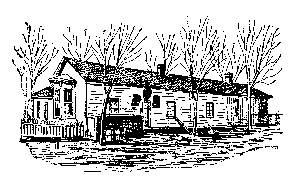LaPorte

The Stage Station at LaPorte


The Stage Station at LaPorte

LaPorte was aptly named by the early trappers and pathfinders. Meaning "behold the gate" in French, it is the gateway to all that mountainous region lying north of the South Platte River and extending from the Plains to the Continental Divide. Trappers built cabins here along the Cache la Poudre River as early as 1828, making it the first white settlement in Larimer County. It became the home of Antoine Janis in 1844, who is often noted as the first permanent white settler north of the Arkansas River. A band of intrepid mountaineers, hunters and trappers made LaPorte their headquarters for fur catching and trading operations. The settlement increased in numbers, including one hundred fifty lodges of Arapahoe Indians who settled peacefully along the river, and in the valley.The winter of 1849 brought Kit Carson and his company of trappers to the headwaters of the Cache la Poudre where they set up camp. In 1860 a town company was organized. It was originally called Colona. Between fifty and sixty log dwellings were erected that year along the banks of the Cache la Poudre River in the valley and in 1861 it was named the county seat of Larimer County.
In 1862, the town of Colona changed its name to LaPorte, and was named the headquarters of the Mountain Division of the Overland Trail Stage Route. A station was erected right along the river, very near where the present Overland Trail now crosses the river. Mrs Taylor, wife of the first stationmaster, was a "good cook" and "gracious hostess", and as described by one diarist, knowing "what to do with beans and dried apples." It is claimed that General Grant stayed at the station in 1868.
The stage fare from Denver to LaPorte was $20.00. The first bridge over the Cache la Poudre River was built as a toll bridge by some enterprising citizens, and during the rush to California, numerous wagons and stage coaches crossed it every day. The toll charged was anywhere from $.50 to $8.00, depending on what source of information is used. In 1864, the bridge was washed away by a flood, and a ferry was rigged up and used for several years until the county built another bridge.
LaPorte soon became a bustling business and supply center for emigrants, with wagon trains and stage coaches constantly passing through. There were four saloons, a brewery, a butcher shop, two blacksmith shops, a general store and a hotel. The store was a thriving business, sometimes making as much as $1000 per day. LaPorte was the most important settlement north of Denver, housing the Stage Station, the County Court House, the military, Indians, and trappers.
In 1863 the 13th Kansas volunteer infantry was stationed at LaPorte, acting as escort for the Overland Stage on the trail to Virginia Dale. During the flood of 1864, the army camp was covered with water, and the soldiers had to suddenly flee to higher ground. In August of that year, Col. Collins came down from Laramie on an inspection tour, and decided to move the army camp to Fort Collins, down river about 6 miles. The new site was given the name Camp Collins, and became the present city of Fort Collins.

Send comments, suggestions or inquiries:
Overland Trail
[Overland Trail | Stations and Stops | Links | Virginia Dale]
Created and maintained by Elizabeth Larson
Copyright © 1996-2001